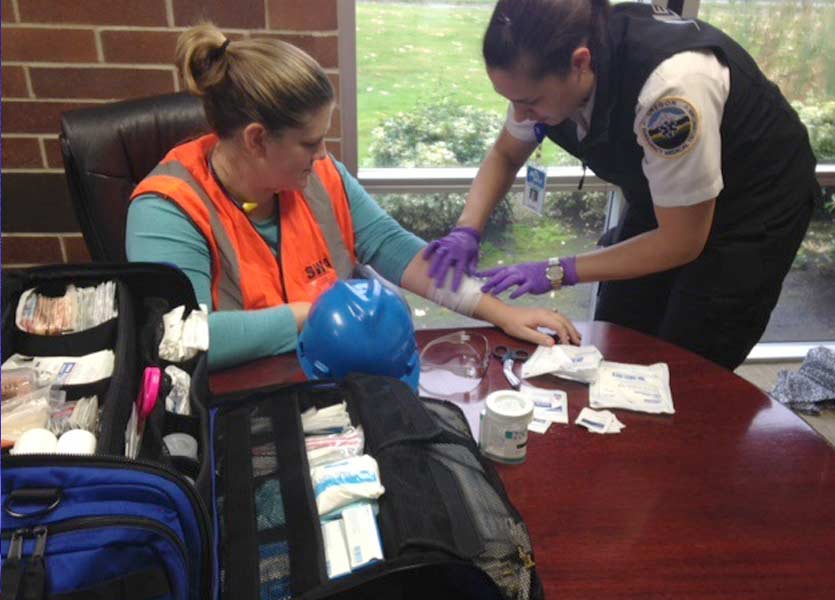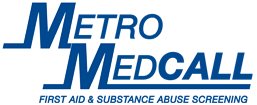
This information is provided as a reference for staff and supervisors to know when to call our dispatch center. They are presented to assist you in planning and training.
CAUTION: WHEN IN DOUBT CALL
503-693-3367 FOR GUIDANCE
ABDOMINAL PAIN
Metro MedCALL may respond to a patient with abdominal pain if there has been no recent injury and the patient has not experienced recent vomiting.
9-1-1 must be called for every patient who has abdominal pain and is vomiting or has had a recent injury.
ALTERED MENTAL STATUS (confusion, disorientation or unconsciousness)
Metro MedCALL may not respond to a patient who has experienced altered mental status.
9-1-1 must be called for any individual who has had any period of unconsciousness or semi-consciousness, confusion, disorientation, or the inability to walk due to dizziness.
BACK & NECK PAIN
Metro MedCALL may respond to minor back injuries if the patient can ambulate.
9-1-1 must be called for any neurologic deficit (dizziness, tingling, loss of feeling) or if the patient is unable to get up or needs to be transported lying down.
BURNS
Metro MedCALL may respond to minor burns that do not involve large areas of the body or cause severe pain.
9-1-1 must be called for patients with significant facial burns, severe burns, burns covering an area larger than the size of the patient’s hand, or severe pain.
CHEMICAL EXPOSURE
Metro MedCALL may respond to a patient who has experienced a chemical exposure, if there is a SDS available and if the patient has no difficulty breathing.
9-1-1 must be called for a patient who has experienced a chemical exposure if there is no SDS available or if the patient is having difficulty breathing.
CRUSH INJURY
Metro MedCALL may respond to a patient who has crushed hands, forearms, or feet.
9-1-1 should be called for a patient with a crush injury that involves more than a hand, forearm, or foot.
EYE INJURIES
Metro MedCALL may respond to minor eye injuries, eye pain, or foreign bodies in the eye.
9-1-1 must be called if the eye is impaled with a large object, not in the socket, or exposed to toxic or caustic chemicals.
FALL
Metro MedCALL may respond to a patient who has had a minor fall and is conscious and alert.
9-1-1 must be called if the height of the fall is greater than five feet, if the patient is unconscious, not acting appropriately, or not alert following the fall.
IMPALED OBJECT
Metro MedCALL may respond to a patient with objects impaled in the extremities.
9-1-1 must be called for a patient who has large objects impaled in the head, neck, torso, and upper thigh.
PAIN
Metro MedCALL may respond to a patient experiencing minor to moderate pain.
9-1-1 must be called if the patient is having severe or uncontrollable pain.
SEIZURE OR UNCONSCIOUS
Metro MedCALL cannot respond to a patient who is unconscious, having a seizure, or recently had a seizure.
9-1-1 must always be called for a patient who is unconscious, having a seizure, or recently had a seizure.
ALLERGIC REACTION
Metro MedCALL may respond to a patient with minor or local allergic reactions.
9-1-1 must be called for a patient experiencing difficulty breathing or a patient with a history of severe allergic reactions.
AMPUTATIONS
Metro MedCALL may respond to an injury involving amputation of fingers or toes.
9-1-1 must be called for an individual who has severed anything more than fingers or toes.
BLEEDING
Metro MedCALL may respond to a call involving minor bleeding or moderate bleeding that can be controlled by applying direct pressure to the wound.
9-1-1 must be called for any profuse bleeding that cannot be controlled with constant direct pressure on the wound.
CHEMICAL BURNS
Metro MedCALL may respond to a patient with a chemical burn smaller than the size of the patient’s hand.
9-1-1 must be called for a patient with a chemical burn larger than the size of the patient’s hand.
CHEST PAIN
Metro MedCALL may respond to a patient with chest pain, if the chest pain can be easily explained by a recent injury.
9-1-1 must be called for patients with chest pain that is not obviously the direct result of a recent injury.
ELECTRIC SHOCK
Metro MedCALL may respond to minor electric shock injuries, if no exit wounds are present, and if the patient is alert and acting appropriately.
9-1-1 should be called for a patient with exit wounds present or is not alert or acting inappropriately.
FRACTURE/DISLOCATION
Metro MedCALL may respond to a patient with a fracture/dislocation involving the hands, forearms, or feet.
9-1-1 must be called if the fracture/dislocation involves more than the hands, forearms, feet, or if the fracture is open and involves more than the hands or feet.
HEAD INJURY
Metro MedCALL may respond to a patient who has experienced minor head trauma with no loss of consciousness or changes in level of consciousness.
9-1-1 must be called for a patient who is unconscious, has experienced periods of unconsciousness, or are not acting alert and appropriate.
NON AMBULATORY
Metro MedCALL will not respond to a patient that is unable to get up or has to be transported lying down.
9-1-1 must always be called for all patients who are unable to get up or have to be transported lying down.
RESPIRATORY DISTRESS/ASTHMA
Metro MedCALL may respond to a patient with mild difficulty breathing if they report significant improvement after using their own inhaler.
9-1-1 must be called for a patient who is having moderate or severe difficulty breathing or not responding to inhaler.
VOMITING
Metro MedCALL may respond to a patient experiencing vomiting that is related to a personal illness and can transport to a primary care physician, urgent care facility, or hospital ED only.
9-1-1 must be called for a patient who is vomiting and has experienced a recent injury or work related exposure.
Metro MedCALL is our go-to for on-call and onsite medical support at our heavy industrial facility in Portland. We can rely on their professionalism and courtesy with our workers at any time—24/7/365.
Greg Miller, Manager of Health, Safety and Security
Gunderson

